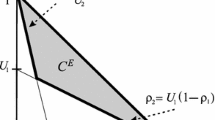Abstract
For stategic-form games with communication, acceptable correlated equilibria are defined as correlated equilibria that are stable when every player has an infinitesimal probability of trembling to any of his feasible actions. A set of acceptable actions is defined for each player, and it is shown that a correlated equilibrium is acceptable if and only if all unacceptable actions have zero probability. The unacceptable actions can be found by computing certain vectors called codomination systems, which extend the concept of dominated actions. Predominant correlated equilibria are defined by iterative elimination of unacceptable actions and are shown to exist.
Similar content being viewed by others
References
Aumann RJ (1974) Subjectivity and correlation in randomized strategies. Journal of Mathematical Economics 1:67–96
Bernheim D (1984) Rationalizable strategic behavior. Econometrica 52:1007–1028
van Damme EEC (1981) Regular equilibrium points ofn-person games in normal form. Eindhoven Institute of Technology discussion paper. To appear in Mathematics of Operations Research
van Damme EEC (1983) Refinements of the Nash equilibrium concept. Springer, Berlin
Farrell J (1983) Communication in games. MIT discussion paper
Harsanyi JC (1975) The tracing procedure: a Bayesian approach to defining a solution forn- person noncooperative games. International Journal of Game Theory 4:61–94
Kalai E, Samet D (1984) Persistent equilibria in strategic games. International Journal of Game Theory 13:129–144
Kohlberg E, Mertens JF (1982) On the strategic stability of equilibria. CORE Discussion Paper No. 8248, Universite Catholique de Louvain
Kreps DM, Wilson R (1982) Sequential equilibria. Econometrica 50:863–894
Kuhn H (1953) Extensive games and the problem of information. In: Kuhn H, Tucker A (eds) Contributions to the theory of games 2. Princeton University Press, Princeton, pp 193–216
Luce RD, Raiffa H (1957) Games and decisions. John Wiley and Sons, New York
McLennan A (1985) Justifiable beliefs in sequential equilibrium. Econometrica 53:889–904
Myerson RB (1978) Refinements of the Nash equilibrium concept. International Journal of Game Theory 1:73–80
Myerson RB (1982) Optimal coordination mechanisms in generalized principal-agent problems. Journal of Mathematical Economics 10:67–81
Myerson RB (1985) Bayesian equilibrium and incentive compatibility: an introduction. In: Hurwicz L, Schmeidler D, Sonnenschein H (eds) Social goals and social organization. Cambridge University Press, Cambridge, pp 229–259
Myerson RB (1985) Multistage games with communication. Center for Mathematical Studies discussion paper No. 590, Northwestern University
Nash JF (1951) Non-cooperative games. Annals of Mathematics 54:286–295
Pearce DG (1984) Rationalizable strategic behavior and the problem of perfection. Econometrica 52:1029–1050
Rockafellar RT (1970) Convex analysis. Princeton University Press, Princeton
Selten R (1975) Reexamination of the perfectness concept for equilibrium points in extensive games. International Journal of Game Theory 4:25–55
Author information
Authors and Affiliations
Rights and permissions
About this article
Cite this article
Myerson, R.B. Acceptable and predominant correlated equilibria. Int J Game Theory 15, 133–154 (1986). https://doi.org/10.1007/BF01769254
Received:
Revised:
Issue Date:
DOI: https://doi.org/10.1007/BF01769254




